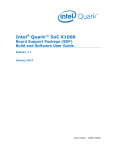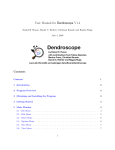Download SortMeRNA User Manual - Bonsai Bioinformatics
Transcript
SortMeRNA User Manual Evguenia Kopylova [email protected] February 2013, version 1.5 1 Contents 1 Introduction 3 2 Installation 2.1 Required g++ compiler version . . . . . . . . . . . 2.1.1 Ubuntu Linux OS instructions . . . . . . 2.1.2 Mac OS X instructions (using MacPorts) 2.2 Install from source code . . . . . . . . . . . . . . 2.3 Install from precompiled code . . . . . . . . . . . . . . . . . . . . . . . . . . . . . . . . . . . . . . . . . . . . . . . . . . . . . . . . . . . . . . . . . . . . . . . . . . . . . . . . . . . . . . . . . . . . . . . . . . . . . . . . . . . . . . . 3 Databases 3 3 3 4 6 7 8 4 How to run SortMeRNA 4.1 Index the rRNA database: command ‘buildtrie’ . . . . . . . . . . . . . . . . 4.1.1 Example 1: buildtrie . . . . . . . . . . . . . . . . . . . . . . . . . . . . 4.2 Filter reads against the indexed rRNA database: command ‘sortmerna’ . . . 4.2.1 Example 2: sortmerna on multiple databases, with output of accepted sorted by database . . . . . . . . . . . . . . . . . . . . . . . . . . . 4.2.2 Example 3: sortmerna on multiple databases, with output of accepted directed to one single file . . . . . . . . . . . . . . . . . . . . . . . . 4.2.3 Example 4: sortmerna on paired-end reads . . . . . . . . . . . . . . . 5 SortMeRNA parameters . . . . . . . . . . . . reads . . . . reads . . . . . . . . 8 8 9 10 11 13 14 16 2 1 Introduction Copyright (C) 2012 Bonsai Bioinformatics Research Group (LIFL - Universit´e Lille 1), CNRS UMR 8022, INRIA 2012 SortMeRNA is a software designed to filter metatranscriptomic reads data. It takes as input a file of reads (fasta or fastq format) and an rRNA database file, and sorts apart the accepted reads and the rejected reads into two files specified by the user. For questions & help, please contact: 1. Evguenia Kopylova 2. Laurent Noe 3. Helene Touzet 2 [email protected] [email protected] [email protected] Installation 2.1 Required g++ compiler version Tested platforms: Ubuntu Linux OS 12.04 and Mac OS X 10.6.8. SortMeRNA uses features of the C++11 standard which are available for GCC compiler versions 4.3 and later. To check your compiler version, type ‘g++ --version’. For compiler versions less than 4.3, please follow Subsection 2.1.1 for Ubuntu Linux OS or Subsection 2.1.2 for Mac OS X, to configure or install a new compiler. 2.1.1 Ubuntu Linux OS instructions (1) Check whether you have other g++ compiler versions installed (4.3 or later), type ‘g++’ then press the tab key → , > g++ (followed by the tab key) (2) If the list output in Step (1) does not include a g++ compiler of version 4.3 or later, install one (SortMeRNA was tested with g++-4.4, g++-4.5 and g++-4.6), > sudo apt-get install g++-4.4 (3) Determine the full directory path of where g++-4.4 was installed (in the example below, the path is /usr/bin/g++-4.4, but others are also possible under different system configurations), > which g++-4.4 /usr/bin/g++-4.4 (4-a) To select g++-4.4 only for compiling SortMeRNA, the user must specify the full path of the compiler in the Makefile, 3 change the line: > CC = g++ to: > CC = /usr/bin/g++-4.4 (the full directory path from Step (3) above) (4-b) To set g++-4.4 as a default compiler, do not edit the Makefile but run the commands, > which g++ /usr/bin/g++ > sudo rm /usr/bin/g++ > sudo ln -s /usr/bin/g++-4.4 /usr/bin/g++ (find the path of the ‘g++’ command) (remove the symbolic link of ‘g++’) (create a new symbolic link from ‘g++’ to ‘g++-4.4’) (should now be 4.4) > g++ --version (5) The user may now run the ‘make’ command in Step (2) of Section 2.2. 2.1.2 Mac OS X instructions (using MacPorts) (1) Check whether you have other g++ compiler versions installed (4.3 or later), type ‘g++’ then press the tab key → , > g++ (followed by the tab key) (2) If the list given by Step (1) does not include a g++ compiler of version 4.3 or later, install one (SortMeRNA was tested with gcc43, gcc44, gcc45, gcc46 and gcc47), > sudo port selfupdate > sudo port upgrade outdated > sudo port install gcc44 (3-a) To select gcc44 only for compiling SortMeRNA, the user must specify the full path of the compiler in the Makefile, change the line: > CC = g++ to: > CC = /opt/local/bin/g++-mp-4.4 (the full directory path of the installed compiler) (3-b) To set gcc44 as a default compiler, do not edit the Makefile but run the commands, > which g++ /opt/local/bin/g++ > sudo rm /opt/local/bin/g++ > sudo ln -s /opt/local/bin/g++-mp-4.4 \ /opt/local/bin/g++ > g++ --version (find the path of the ‘g++’ command) (remove the symbolic link of ‘g++’) (create a new symbolic link from ‘g++’ to ‘g++-mp-4.4’) (should now be 4.4) (4) The user may now run the ‘make’ command in Step (2) of Section 2.2. If linking errors occur 4 such as ‘library not loaded’ or ‘undefined symbols for architecture’, try to upgrade your current compiler version to establish correct links, > sudo port -n upgrade --force gcc44 5 2.2 Install from source code 1. Download sortmerna.tar.gz from http://bioinfo.lifl.fr/RNA/sortmerna 2. Extract the source code package into a directory of your choice (must have permissions to read and write) and build the executable files sortmerna and buildtrie, > tar -zxvf sortmerna.tar.gz > cd sortmerna > make (note: The g++ compiler version must be 4.3 or later for ‘make’ to work. Please see Subsection 2.1 to configure or install a new compiler if the command ‘which g++’ returns a version less than 4.3) 3. SortMeRNA indexes a database by writing its contents to the ‘/automata’ folder, which is initially located in the directory ‘/sortmerna/automata’. It is essential to set the $SORTMERNADIR environmental variable to the path where the ‘/automata’ folder is found, so that the program may read and write from it. The user may move the ‘/automata’ folder to a workspace with larger memory, separately from the directory ‘/sortmerna’. To find the path of the ‘/automata’ folder, go into the directory where it is located and type, > pwd /some/path/to/sortmerna 4. Open the ˜/.bashrc (or ˜/.profile) file in any editor and add the line, > export SORTMERNADIR="/some/path/to/sortmerna/automata" > export PATH="$PATH:/some/path/to/sortmerna" 5. Run the ˜/.bashrc (or ˜/.profile) file to add the variable $SORTMERNADIR and update the variable $PATH in the list of environment variables, > source ~/.bashrc or > source ~/.profile 6. Check that $SORTMERNADIR has been added, > echo $SORTMERNADIR /some/path/to/sortmerna (if it has not been added, this path will be empty) 7. Check that $PATH has been updated with the additional directory search path, > echo $PATH /usr/local/bin:/usr/bin:...:/some/path/to/sortmerna 8. Check the path of the executables, 6 > which sortmerna buildtrie /some/path/to/sortmerna/sortmerna /some/path/to/sortmerna/buildtrie 9. To begin using SortMeRNA, type ‘buildtrie -h’ or ‘sortmerna -h’. 2.3 Install from precompiled code 1. Download, sortmerna_linux_64.tar.gz sortmerna_linux_32.tar.gz sortmerna_mac_64.tar.gz or or from http://bioinfo.lifl.fr/RNA/sortmerna 2. Extract the source code package into a directory of your choice (must have permissions to read and write), > tar -zxvf sortmerna_linux_64.tar.gz > cd sortmerna_linux_64 3. SortMeRNA indexes a database by writing its contents to the ‘/automata’ folder, which is initially located in the directory ‘/sortmerna linux 64/automata’. It is essential to set the $SORTMERNADIR environmental variable to the path where the ‘/automata’ folder is found, so that the program may read and write from it. The user may move the ‘/automata’ folder to a workspace with larger memory, separately from the directory ‘/sortmerna linux 64’. To find the path of the ‘/automata’ folder, go into the directory where it is located and type, > pwd /some/path/to/sortmerna_linux_64 4. Open the ˜/.bashrc (or ˜/.profile) file in any editor and add the line, > export SORTMERNADIR="/some/path/to/sortmerna_linux_64" > export PATH="$PATH:/some/path/to/sortmerna_linux_64" 5. Run the ˜/.bashrc (or ˜/.profile) file to add the variable $SORTMERNADIR and update the variable $PATH in the list of environment variables, > source ~/.bashrc or > source ~/.profile 6. Check that $SORTMERNADIR has been added, > echo $SORTMERNADIR /some/path/to/sortmerna_linux_64 (if it has not been added, this path will be empty) 7 7. Check that the $PATH has been updated with the additional directory search path, > echo $PATH /usr/local/bin:/usr/bin:...:/some/path/to/sortmerna_linux_64 8. Check the path of the executables, > which sortmerna buildtrie /some/path/to/sortmerna_linux_64/sortmerna /some/path/to/sortmerna_linux_64/buildtrie 9. To begin using SortMeRNA, type ‘buildtrie -h’ or ‘sortmerna -h’. 3 Databases SortMeRNA comes prepackaged with 8 databases, representative database silva-bac-16s-database-id85.fasta silva-arc-16s-database-id95.fasta silva-euk-18s-database-id95.fasta silva-bac-23s-database-id95.fasta silva-arc-23s-database-id95.fasta silva-euk-28s-database-id95.fasta rfam-5s-database-id98.fasta rfam-5.8s-database-id98.fasta id % 85 95 95 98 98 98 98 98 average id % 91.6 96.7 96.7 99.4 99.5 99.1 99.2 98.9 # seq 8174 3845 4512 3055 164 4578 59513 13034 origin SILVA SSU Ref NR v.111 SILVA SSU Ref NR v.111 SILVA SSU Ref NR v.111 SILVA LSU Ref v.111 SILVA LSU Ref v.111 SILVA LSU Ref v.111 RFAM RFAM # seq 244077 10919 31862 19580 405 9321 116760 225185 filtered to remove 23s 23s 26s,28s,23s 16s,26s,28s 16s,26s,28s 18s – – The tool UCLUST was used to reduce the size of the original databases. id %: members of the cluster must have identity at least this % id with the representative sequence average id %: average identity of a cluster member to the representative sequence Remark: The user must first index the fasta database by using the command buildtrie and then filter reads against the database using the command sortmerna. 4 4.1 How to run SortMeRNA Index the rRNA database: command ‘buildtrie’ The executable buildtrie indexes an rRNA database. To see the man page for buildtrie, > buildtrie -h 8 This program builds a Burst trie on an input rRNA database file in fasta format and stores the material in binary files under the folder ‘automata’ ./buildtrie --db [path to rrnas database file name {.fasta}] {OPTIONS} The list of OPTIONS can be left blank, the default values will be used: -L length of the sliding window (the seed) (default: 18) -F search only the forward strand -R search only the reverse-complementary strand (default: both strands are searched) -h help There are eight rRNA representative databases provided in the ‘sortmerna/rRNA databases’ folder. All databases were derived from the SILVA SSU and LSU databases (release 111) and the RFAM databases using the tool UCLUST. Additionally, the user can index their own database. 4.1.1 Example 1: buildtrie > buildtrie --db ~/sortmerna/rRNA_databases/silva-bac-16s-database-id85.fasta Burst trie(s) built in: 36.7594s Writing Burst trie forward to silva-bac-16s-database-id85.bursttrief.dat Writing Burst trie reverse to silva-bac-16s-database-id85.bursttrier.dat Done. The indexed databases (ex. silva-bac-16s-database-id85.bursttrief.dat) will be stored in the directory ‘/some/path/to/sortmerna/automata’ (the path stored in variable $SORTMERNADIR, which was established in Step 1-4 of Subsection 2.2 or Subsection 2.3) and later retrieved by the command sortmerna, explained in the following section. 9 4.2 Filter reads against the indexed rRNA database: command ‘sortmerna’ The executable sortmerna filters rRNA reads against an indexed rRNA database. To see the man page for sortmerna, > sortmerna -h To run SortMeRNA, type in any order after ‘sortmerna’: --I [illumina reads file name {fasta/fastq}] --454 [roche 454 reads file name {fasta/fastq}] -n --db number of databases to use (must precede --db) [rrnas database name(s)] One database, ex 1. -n 1 --db /path1/database1.fasta Multiple databases, ex 2. -n 2 --db /path2/database2.fasta /path3/database3.fasta {OPTIONS} The list of OPTIONS can be left blank, the default values will be used: --accept --other [accepted reads file name] [rejected reads file name] (default: no output files are created) --bydbs output the accepted reads by database (default: concatenated file of reads) --log [overall statistics file name] (default: no statistics file created) --paired-in --paired-out put both paired-end reads into --accept file put both paired-end reads into --other file (default: if one read is accepted and the other is not, separate the reads into --accept and --other files) -r ratio of the number of hits on the read / read length (default Illumina: 0.25, Roche 454: 0.15) -F -R search only the forward strand search only the reverse-complementary strand (default: both strands are searched) -a number of threads to use 10 (default: 1) -m (m x 4096 bytes) for loading the reads into memory ex. ‘-m 4’ means 4*4096 = 16384 bytes will be allocated for the reads note: maximum -m is 1020040 (default: m = 262144 = 1GB) -v verbose (default: deactivated) -h help --version version number The command sortmerna takes as input a list of rRNA databases (in fasta format) and a set of Illumina or Roche 454 reads (in fasta or fastq format), and filters out the reads matching to at least one of the rRNA databases. The user has an option to output the accepted reads into a single file (default), or into multiple files sorted by the closest matching database (add the flag --bydbs). The indexed part of the databases created by buildtrie is loaded into sortmerna independently. The user can adjust the amount of memory allocated for loading the reads through the command option -m. By default, -m is set to be high enough for 1GB. If the reads file is larger than 1GB, then sortmerna internally divides the file into partial sections of 1GB and executes one section at a time. Hence, if a user has an input file of 15GB and only 1GB of RAM to store it, the file will be processed in partial sections using mmap without having to physically split it prior to execution. Otherwise, the user can set -m high enough to store all 15GB in RAM. 4.2.1 Example 2: sortmerna on multiple databases, with output of accepted reads sorted by database > sortmerna -n 3 --db ~/sortmerna/rRNA_databases/silva-bac-23s-database-id98.fasta ~/sortmerna/rRNA_databases/silva-bac-16s-database-id85.fasta ~/sortmerna/rRNA_databases/silva-euk-18s-database-id95.fasta --accept rrna --bydbs --454 SRR106861-filtered.fasta --log bilan -a 3 -v WARNING: option ‘--other’ has been left blank, no output file for rejected reads .. ------------------------------------------------------Welcome to SortMeRNA! Copyright (C) 2012 Bonsai Bioinformatics Research Group LIFL, Universit´ e Lille 1, CNRS UMR 8022, INRIA 2012 ------------------------------------------------------11 The size of the reads file <33862846> bytes will be executed in 1 partial section(s) of size <33862846> bytes [Partial section # 1] --------------------Time to mmap reads and set up pointers: 0.2164s Begin analysis of: ./rRNA_databases/silva-bac-23s-database-id98.fasta Time to load the Burst trie: Begin parallel traversal ... Time of parallel traversal of automata: 1.4488s 14.2974s Begin analysis of: ./rRNA_databases/silva-bac-16s-database-id85.fasta Time to load the Burst trie: Begin parallel traversal ... Time of parallel traversal of automata: 2.2975s 17.3430s Begin analysis of: ./rRNA_databases/silva-euk-28s-database-id98.fasta Time to load the Burst trie: Begin parallel traversal ... Time of parallel traversal of automata: 2.0302s Total number of reads found in current section: 95206 Time to output reads to file: Total number of reads found: 1.7558s 95206 19.0678s The option ‘--log bilan’ will create an overall statistics file called bilan.log, > cat bilan.log Time and Date Settings: r = 0.15 L = 18 reads file: ~/SRR106861-filtered.fasta Results: total reads: 105873 non-rRNA: 10667 rRNA: 95206 12 % rRNA: 89.92% silva-bac-23s-database-id98.fasta 64.39% silva-bac-16s-database-id85.fasta 25.53% silva-euk-28s-database-id98.fasta 0.009445% Now, we can manually check the number of reads matched per database: > grep -c ‘>’ rrna.* rrna.silva-bac-16s-database-id85.fasta:27026 rrna.silva-bac-23s-database-id98.fasta:68170 rrna.silva-euk-28s-database-id98.fasta:10 4.2.2 Example 3: sortmerna on multiple databases, with output of accepted reads directed to one single file > sortmerna -n 3 --db ~/sortmerna/rRNA_databases/silva-bac-23s-database-id98.fasta ~/sortmerna/rRNA_databases/silva-bac-16s-database-id85.fasta ~/sortmerna/rRNA_databases/silva-euk-18s-database-id95.fasta --accept rrna --454 SRR106861-filtered.fasta --log bilan -a 3 -v WARNING: option ‘--other’ has been left blank, no output file for rejected reads .. ------------------------------------------------------Welcome to SortMeRNA! Copyright (C) 2012 Bonsai Bioinformatics Research Group LIFL, Universit´ e Lille 1, CNRS UMR 8022, INRIA 2012 ------------------------------------------------------The size of the reads file <33862846> bytes will be executed in 1 partial section(s) of size <33862846> bytes [Partial section # 1] --------------------Time to mmap reads and set up pointers: 0.2184s Begin analysis of: ./rRNA_databases/silva-bac-23s-database-id98.fasta Time to load the Burst trie: Begin parallel traversal ... Time of parallel traversal of automata: 13 1.4594s 14.5262s Begin analysis of: ./rRNA_databases/silva-bac-16s-database-id85.fasta Time to load the Burst trie: Begin parallel traversal ... Time of parallel traversal of automata: 2.2632s 17.3602s Begin analysis of: ./rRNA_databases/silva-euk-28s-database-id98.fasta Time to load the Burst trie: Begin parallel traversal ... Time of parallel traversal of automata: 1.9980s Total number of reads found in current section: 95206 Time to output reads to file: Total number of reads found: 0.9978s 95206 19.4148s Now, we can manually check the number of reads matched for all databases: > grep -c ‘>’ rrna.* rrna.fasta:95206 4.2.3 Example 4: sortmerna on paired-end reads This example illustrates three cases of output for paired-end reads: default, --paired-in and --paired-out. We use the set6-database.fasta found under Section 3.2 of the Supplementary file (also available online at bioinfo.lifl.fr/RNA/sortmerna/material.php). As for the reads, 5000 Illumina paired-end reads were simulated using MetaSim on set6-database.fasta. The reads were then arranged to have 2475 pairs of rRNA, and the other 25 pairs where exactly one read is rRNA and the other is not (this is possible if one of the reads covers a low complexity region on the rRNA sequence). Remark: The statistics in the --log file will always give the true number of reads classified as rRNA. Case 1: We don’t care to keep the paired-end order in the output (default). > sortmerna -n 1 --db set6-database.fasta --I paired-end-5000-reads.fasta --accept rrna --other nonrrna --log bilan -a 1 14 > cat bilan.log Results: total reads: non-rRNA: rRNA: % rRNA: 5000 50 4950 99% set6-database.fasta 99% > grep -c ‘>’ rrna.fasta nonrrna.fasta rrna.fasta: 4950 nonrrna.fasta: 50 Case 2: We want to accept all pairs with at least one read that hits (--paired-in). > sortmerna -n 1 --db set6-database.fasta --I paired-end-5000-reads.fasta --accept rrna --other nonrrna --log bilan --paired-in -a 1 > cat bilan.log Results: total reads: non-rRNA: rRNA: % rRNA: 5000 50 4950 99% set6-database.fasta 99% > grep -c ‘>’ rrna.fasta nonrrna.fasta rrna.fasta: 5000 nonrrna.fasta: 0 Case 3: We want to reject all pairs with at least one read that hits (--paired-out). > sortmerna -n 1 --db set6-database.fasta --I paired-end-5000-reads.fasta --accept rrna --other nonrrna 15 --log bilan --paired-out -a 1 > cat bilan.log Results: total reads: non-rRNA: rRNA: % rRNA: 5000 50 4950 99% set6-database.fasta 99% > grep -c ‘>’ rrna.fasta nonrrna.fasta rrna.fasta: 4900 nonrrna.fasta: 100 5 SortMeRNA parameters There are two parameters in SortMeRNA which the user can moderate for performance: The length of the sliding window s (the seed), and the threshold ratio r of matching windows to the rRNA database for a read to be accepted. Both of these paramaters and their default values are discussed in detail in Section 2: Parameter Setting of the supplementary file. The user may adjust the threshold parameter r with the sortmerna command-line option -r [new ratio]. To adjust the length of the sliding window s, the user must provide the option -L [new length (even integer)] when indexing an rRNA database using the buildtrie executable. 16





























